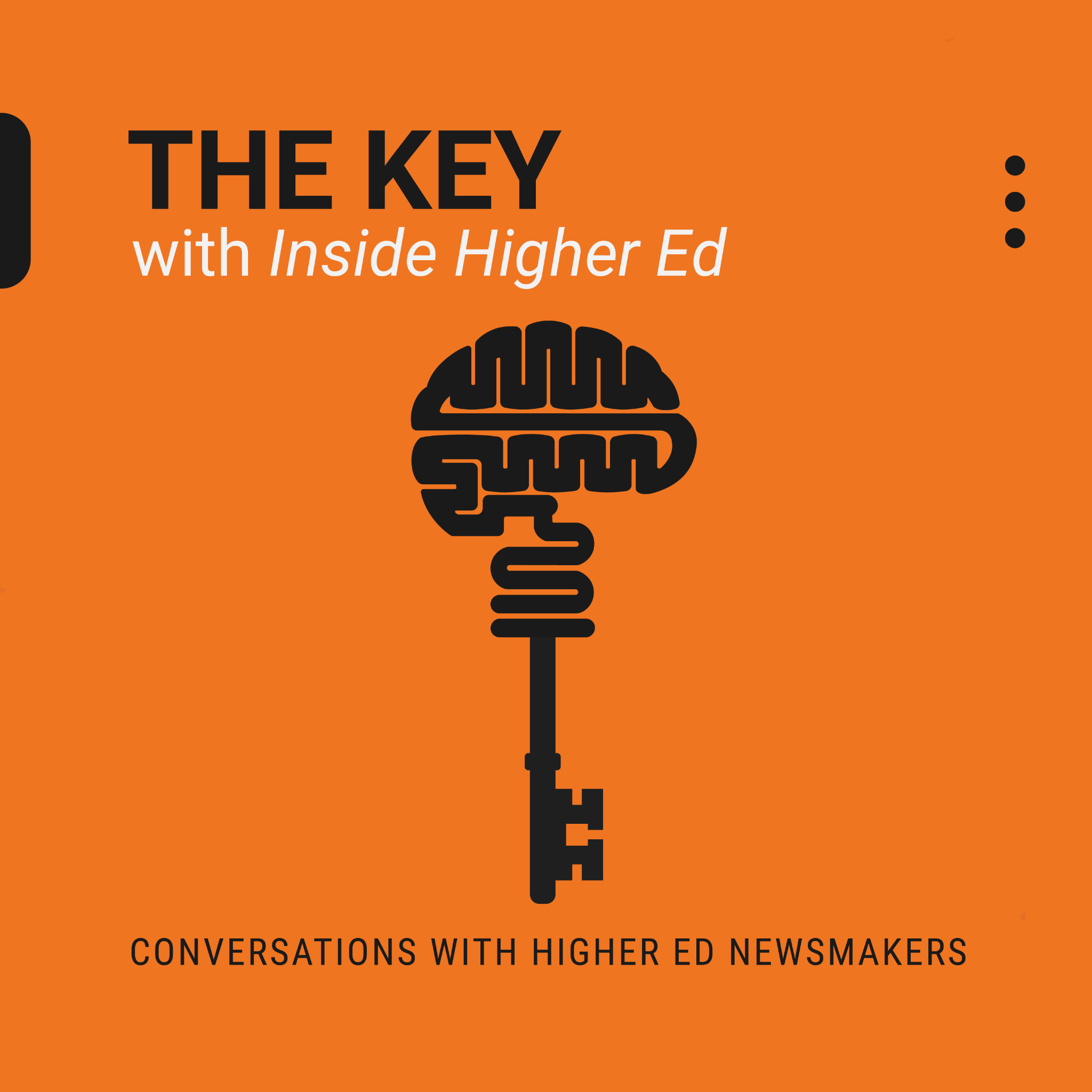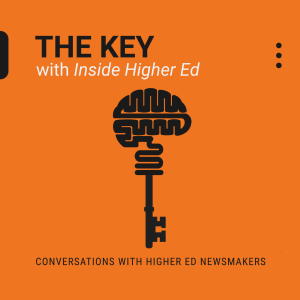
Hear candid conversations with higher-ed newsmakers. Hosted by Inside Higher Ed. Inside Higher Ed is the leading source for the latest news, analysis, and services for the entire US higher education community.
Hear candid conversations with higher-ed newsmakers. Hosted by Inside Higher Ed. Inside Higher Ed is the leading source for the latest news, analysis, and services for the entire US higher education community.
Episodes

Wednesday Oct 16, 2024
Ep. 129: Voices of Student Success: A College Bridge Program for Incarcerated Students
Wednesday Oct 16, 2024
Wednesday Oct 16, 2024
In July 2023, Congress lifted a ban on federal Pell Grant funding for incarcerated individuals in prison education programs, but there still remain barriers to enrollment and success for these learners. The Petey Greene Program (PGP), a non-profit organization that partners with prisons and higher education institutions, launched a College Bridge program in 2020 to increase college-level writing, reading and math skills for incarcerated students.
In this episode, PGP’s Chiara Benetollo, executive director of The Puttkammer Center for Educational Justice and Equity, and Katherine Meloney, director of the Villanova Program at SCI Phoenix, discuss the college bridge program and the ways higher ed can support justice and learning for incarcerated individuals.
Hosted by Inside Higher Ed Student Success Reporter Ashley Mowreader.
This episode is sponsored by KI. Read a transcript of the podcast here.
Follow us on Apple Podcasts Google Podcasts Stitcher Spotify

Wednesday Oct 02, 2024
Ep. 128: Voices of Student Success: Building a Culture of Mentorship
Wednesday Oct 02, 2024
Wednesday Oct 02, 2024
Prior research shows students who have at least one connection to campus are more likely to persist, retain and complete a college degree, particularly for students from historically marginalized or less privileged backgrounds. However, building high-quality and long-lasting relationships can feel challenging or unattainable for many college students.
In this episode, Elon University’s Peter Felten, and Emily Krechel, who serve as members on the Mentoring Initiatives Design Team, discuss the role of relationships in student success and how Elon stakeholders look to create a relationship-rich university community.
Hosted by Inside Higher Ed Student Success Reporter Ashley Mowreader. This episode is sponsored by KI. Read a transcript of the podcast here.
Follow us on Apple Podcasts Google Podcasts Stitcher Spotify

Wednesday Sep 18, 2024
Ep. 127:Voices of Student Success: Breaking Down Barriers to Basic Needs Resources
Wednesday Sep 18, 2024
Wednesday Sep 18, 2024
Rising costs of living and increasing student housing rates have exacerbated college retention efforts as campus leaders look to tackle a rising concern: basic needs insecurity.
A lack of essential resources such as food, housing and clothing and general financial strain are two of the top reasons students say they leave college.
To address this issue and provide resources to students, the University of Houston opened its Center for Student Advocacy and Community in 2020, which houses some of the university’s essential needs programs. I spoke with the center’s director and assistant director about the relationship between student success and basic needs and how to promote resources across campus.
In this episode, host Ashley Mowreader speaks with the University of Houston’s director, Michael Crook, and associate director, Kevin Nguyen, of the Center for Student Advocacy and Community to learn more about how the center operates, the ties between basic needs and student success and some of the center’s future goals.
Hosted by Inside Higher Ed Student Success Reporter Ashley Mowreader. Read a transcript of the podcast here.
Follow us on Apple Podcasts Google Podcasts Stitcher Spotify

Wednesday Sep 04, 2024
Ep. 126: Voices of Student Success: The Role of Belonging in Campus Conflict, Protests
Wednesday Sep 04, 2024
Wednesday Sep 04, 2024
Since the start of the Israel-Hamas war in October 2023, colleges and universities have seen heightened tensions on campus as student protesters demand change from their administrators.
Anti-war protests on college campuses are not a new phenomenon, with many institutions seeing similar unrest during the 1960s during the Vietnam War. The University of South Carolina was one such institution, which saw a general unrest among its student body amid racial tensions, the anti-war movement and other institutional grievances which came to a head in May 1970.
The University of South Carolina took an unconventional approach to mitigate student frustrations, which included implementing a comprehensive University 101 course that infused feelings of belonging among participants. The initiative was largely successful, with the university experiencing no student riots for another 50 years.
In this episode, John Gardner, one of the professors who helped create the first-year seminar at USC and founder of the John N. Gardner Institute for Excellence in Undergraduate Education, reflects on the protests of the 70s and shares how campus leaders today can learn from the past.
Hosted by Inside Higher Ed Student Success Reporter Ashley Mowreader. Read a transcript of the podcast here.
Follow us on Apple Podcasts Google Podcasts Stitcher Spotify

Wednesday Aug 21, 2024
Ep. 125: Voices of Student Success: Improving campus facilities for student wellness
Wednesday Aug 21, 2024
Wednesday Aug 21, 2024
With student mental health concerns on the rise, college leaders have turned their attention outward to campus facilities and the role space, light, sound and décor can play in student learning and healthy living. Many college campuses have established wellness rooms, sensory spaces or relaxation zones to promote healthy habits and academic success for learners.
The focus on environmental wellness is also an inclusive effort, supporting students who struggle with sensory issues, including those with learning or developmental disabilities, and promotes universal design thinking.
In this episode, experts from design firm HKS, Renae Mantooth, research lead in education, and Brad Robichaux, studio practice leader, discuss the science behind environmental wellness and how colleges are adapting to serve their students. Later, hear from Lauren Kehoe, then-accessibility and accommodations librarian at New York University, about how NYU adapted a room in the library to create a safe space for neurodiverse students to study and destress.
Hosted by Inside Higher Ed Student Success Reporter Ashley Mowreader. Read a transcript of the podcast here.

Wednesday Aug 07, 2024
Ep. 124: Voices of Student Success: Improving Upward Transfer Processes
Wednesday Aug 07, 2024
Wednesday Aug 07, 2024
Community college students make up 40 percent of enrollment in U.S. higher education, and 80 percent of those students want to go on to earn a bachelor’s degree. However, only around 16 percent of those students will be successful in transferring and completing a four-year degree within six years after transferring.
Transfer students often lose credits when continuing to their bachelor’s degree, slowing their progress toward graduation and increasing the costs associated with higher education. Transfer advocates recognize the need for state and institutional interventions (both at the two- and four-year level) to improve processes and promote degree attainment.
In this episode, researchers from the Community College Research Center at Columbia University’s Teachers College, Aurely Garcia Tulloch and Tatiana Velasco Rodriguez, discuss CCRC’s current projects to improve transfer across the country. Later, hear from Pamela Johnston, dean of career and academic planning at Tallahassee State College, about how the institution has revised its advising process to make registration, transfer planning and working with an adviser more seamless for students.
Hosted by Inside Higher Ed Student Success Reporter Ashley Mowreader. Read a transcript of the podcast here.

Wednesday Jul 31, 2024
Ep. 123: Reprise: Generative AI’s Potential Influence on Teaching and Learning
Wednesday Jul 31, 2024
Wednesday Jul 31, 2024
Discussions about the impact of generative artificial intelligence in teaching and learning are steadily moving beyond questions about whether and how students will cheat.
Today’s episode of The Key is drawn from a workshop expertly led by Inside Higher Ed’s Colleen Flaherty at the Digital Universities U.S. conference at Washington University in St. Louis.
The conversation on “Teaching with Generative AI: Benefits and Risks” featured four thoughtful experts on teaching and learning: Asim Ali, executive director of the Biggio Center for the Enhancement of Teaching and Learning at Auburn University; Trey Conatser, director of the Center for the Enhancement of Learning and Teaching at the University of Kentucky; Emily Thompson, director of online programs at Washington University’s School of Medicine, and Michael Reese, associate dean at Johns Hopkins University’s Center for Teaching Excellence and Innovation.
You’ll hear precious little discussion about cheating, but a lot of talk about the need for faculty training and support and the importance of bridging potential gaps in access and overcoming bias in the technology, among other things.
The Key is hosted by Inside Higher Ed Co-founder and Editor Doug Lederman. This episode is sponsored by Mongoose.

Wednesday Jul 24, 2024
Ep. 122: Voices of Student Success: Tech Solutions for Student Mental Health
Wednesday Jul 24, 2024
Wednesday Jul 24, 2024
Student mental health is a growing concern for higher education administrators and practitioners as national rates of anxiety, depression and loneliness grow among college learners. During the COVID-19 pandemic, colleges and universities made heavy investments into digital solutions to improve students’ health and wellness, but how well do these applications serve students?
In this episode, Sara Abelson, assistant professor and senior director of training and education at The Hope Center, explains what digital mental health interventions are, how they support students’ mental health and the need for more data regarding these interventions and the students who use them. Abelson is one of four authors of a recently published report by the Hope Center, commissioned by the Ruderman Family Foundation and in partnership with the Healthy Minds Network and Boston University.
Hosted by Inside Higher Ed Student Success Reporter Ashley Mowreader. Read a transcript of the podcast here.

Wednesday Jul 10, 2024
Ep. 121: Voices of Student Success: Institutional change for Black student success
Wednesday Jul 10, 2024
Wednesday Jul 10, 2024
Nationally, Black students are less likely than their white peers to persist, retain and earn a degree. Many interventions at colleges and universities seek to support struggling Black students, but a new program at Sacramento State University aims to celebrate Black excellence and history, recognizing Black students as scholars.
In this episode, hear from Luke Wood, president of Sac State about the California State University’s commitment to improve Black student success, the foundation of the Black Honors College and a state-wide bill to recognize California institutions that help Black students achieve.
Hosted by Inside Higher Ed Student Success Reporter Ashley Mowreader. Read a transcript of the podcast here.

Wednesday Jun 26, 2024
Ep. 119: Voices of Student Success: Careers as an Undercurrent
Wednesday Jun 26, 2024
Wednesday Jun 26, 2024
Recent public polls have found American’s confidence in higher education is waning, but current college students say they still see the investment they’re making in their future. Colleges, universities and national groups are looking to help students make the most of their degree through professional skill development and embedding careers into curriculum.
In this episode, hear from Shawn VanDerziel, CEO of the National Association for Colleges and Employers about the national state of career curriculum in higher education, and Jim Duffy, associate dean of co-curricular education from Gettysburg College, to learn more about the college’s new strategic plan, which incorporates career development throughout the student experience.
Hosted by Inside Higher Ed Student Success Reporter Ashley Mowreader.
